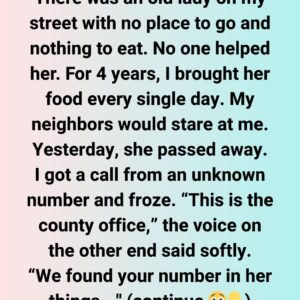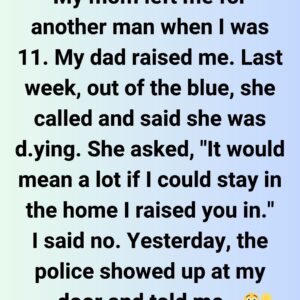Jenna had always known motherhood would be demanding. Friends told her about sleepless nights, endless laundry, and the constant cycle of feeding, changing, and soothing. She thought she was prepared. She even imagined that amidst the exhaustion, she would feel joy and fulfillment that outweighed it all. But reality proved far more brutal than her expectations.
The nights stretched endlessly as her newborn woke every hour. Days blurred together, filled with chores that seemed to multiply the harder she tried to stay on top of them. Meals were hurried, laundry piled up despite her best efforts, and the house—though spotless in appearance—
felt like a prison of obligations. On the surface, Jenna was holding it together. Inside, she was unraveling. The weight of perfection, of trying to be everything at once, pressed down until she felt crushed.
John, her husband, noticed her exhaustion, but his solution missed the mark entirely. Believing he was helping, he suggested that his mother move in for a while. Jenna, desperate for relief, agreed. She convinced herself that the old saying was true—that it takes a village to raise a child. She wanted to believe her village was finally stepping in to help.
But what arrived was not peace. It was chaos.
From the very first week, her mother-in-law transformed their quiet home into a revolving door of guests. Relatives, neighbors, and old friends dropped by daily. The house echoed with laughter and chatter, but it was noise Jenna didn’t need. While she tiptoed upstairs, rocking her newborn to sleep, the downstairs throbbed with energy that only shattered her fragile calm. Instead of support, she felt invaded.
The breaking point came one evening. Jenna had finally lulled her baby into a deep sleep after hours of fussing. Hungry and drained, she crept downstairs, only to find the kitchen stripped bare. Pots and pans sat empty, dinner already eaten. Her mother-in-law, with a casual shrug, said, “Well, you didn’t come down, so we assumed you weren’t hungry.”
The words stung like a slap, but the real wound came from John. Instead of defending her, he sided with his mother. He accused Jenna of “doing nothing all day” and told her to clean up.
Something inside Jenna shattered in that moment. Her exhaustion turned to fury and heartbreak, but when she tried to express her feelings, her words were dismissed as weakness. The argument escalated until the walls seemed to close in around her. Feeling cornered, Jenna packed a bag, gathered her baby, and drove to her own mother’s house.
Even there, peace eluded her. John’s phone calls followed, demanding that she apologize to his mother. His words showed no recognition of her pain, only loyalty to the woman who had caused it. Jenna felt trapped, torn between the family she married into and the fragile bond she was trying to preserve with her newborn.
In desperation, she reached out to the one person she believed could bring balance: John’s father. She poured out her story, her voice trembling as she recounted every detail. He listened quietly, but his silence carried weight. Finally, he spoke with firm resolve: “Get ready. I’m coming to take you and the baby home.”
When they returned to the house, the scene was almost surreal. John and his mother lounged on the couch, laughing at the television, oblivious to the storm they had created. The atmosphere changed the moment John’s father walked in. His voice was steady, but the steel in his tone silenced the room.
He turned to his wife first. “It’s enough,” he said, eyes fixed on her. “You’ve caused enough harm. It’s time for you to leave.” To Jenna’s surprise, she didn’t argue. Perhaps she sensed that his patience had run out. She gathered her things quietly, and for once, the house fell silent.
Then he faced John. Disappointment etched every line of his face. “You need to grow up,” he said. “You’re not just a son anymore—you’re a husband and a father. Jenna gave birth five weeks ago. She needs your support, not your criticism.”
John lowered his eyes, the shame impossible to hide. For the first time, he seemed to grasp the depth of his failure. He apologized to Jenna, not with empty words, but with sincerity that reached his eyes. He promised to do better.
And this time, Jenna believed him.
The days that followed marked the beginning of change. His mother still visited, but the visits were brief and purposeful—she actually helped rather than hindered. John stepped up in ways Jenna had longed for. He held the baby during midnight cries, folded laundry without being asked, and learned to cook simple meals. Most importantly, he was present, offering his attention, his care, and his partnership.
The house began to feel lighter, not because the chores lessened, but because the burden was finally shared. Jenna no longer felt invisible or alone.
In the end, it was John’s father who had saved them. With a few words, he reminded them all that family isn’t built on appearances or authority—it’s built on empathy, respect, and the willingness to shoulder one another’s struggles. His intervention restored balance in their home and gave Jenna the space to breathe again.
Motherhood was still exhausting, but now it was less lonely. Jenna could finally feel the joy she had once imagined, because someone stood beside her, lifting when she could no longer carry the weight alone.
Sometimes heroes don’t come in uniforms or capes. Sometimes they arrive in the form of a quiet man who sees the truth, speaks it aloud, and reminds everyone that love means action.





